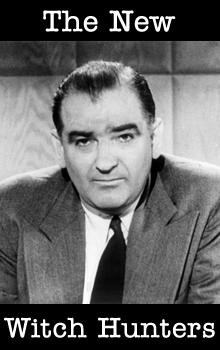Is King County Metro running an entitlement program for managers?
King County has an incentive pay program called Merit Over the Top for “senior employees” (i.e., lower and middle management) who are judged by their supervisors to be outstanding performers but are at the top annual step of their 10-step pay range and so can’t get paid any more. The “over the top” part means over the top of the 10th and highest step in the pay range. The “merit” part means that the bonus is earned and not automatically granted. When the program was begun in 2001 the amount of the bonus was flexible within a wide range, but since 2017 it’s been fixed at either 2.5% or 5% of the employee’s salary, depending on the supervisor’s recommendation. In practice all bonuses are 5%. The bonus is spread out over a year’s worth of paychecks and is paid in the year following the year in which it’s awarded to the employee, based on their annual performance evaluation.
Who’s eligible?
So who gets the extra cash in their paycheck? According to the relevant administrative code (KCC 3.15.020):
An appointing authority may grant an employee incentive pay up to five percent above the top step of the range for a period of twelve months, if all of the following conditions are met:
-
-
- the employee is not a department director;
- the employee has been at the top step of the prior or current range for two years before the award of the increase; and
- the employee has demonstrated continuous outstanding performance;
-
The intent of Over the Top was to keep the best employees from leaving King County for greener pastures, but it has turned out to be something quite different. The King County Council and Executive Dow Constantine know the program isn’t working as intended but has been unwilling to make changes.
Metro Transit: An Over the Top case study
The Over the Top program has an annual budget of $7 million countywide, but among the dozens of King County departments, Metro Transit (“the bus company”) gets the biggest chunk of the money. 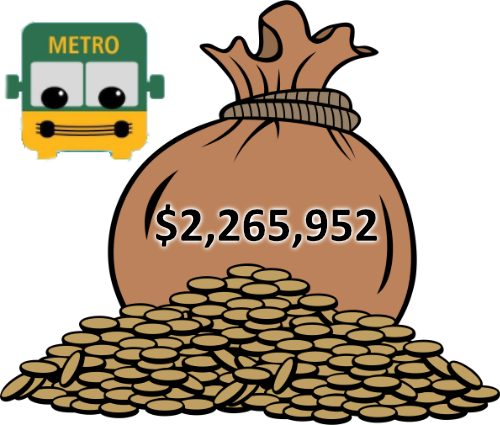 In 2022, 380 Metro management employees will get paid a total of $2,265,952 in Over the Tope bonuses, which comprises 32% of the total $7 million allotment. Since Metro’s 4,500 employees represent 32% of the County’s total workforce of 14,000 we can assume that money is allotted to each department or hiring unit by workforce size and then doled out by supervisors, possibly according to unwritten quotas.
In 2022, 380 Metro management employees will get paid a total of $2,265,952 in Over the Tope bonuses, which comprises 32% of the total $7 million allotment. Since Metro’s 4,500 employees represent 32% of the County’s total workforce of 14,000 we can assume that money is allotted to each department or hiring unit by workforce size and then doled out by supervisors, possibly according to unwritten quotas.
Use it or lose it.
Department allotments wouldn’t roll over from year to year, so any bonus money not awarded to employees by the end of each year would be lost. That would naturally be an incentive for department heads and upper-level managers to dish out bonus money to people whether they deserved it or not.
The screen below shows an extract from the list of King County Metro Transit employees who were awarded the Over the Top bonus in 2022. The full document can be found here:
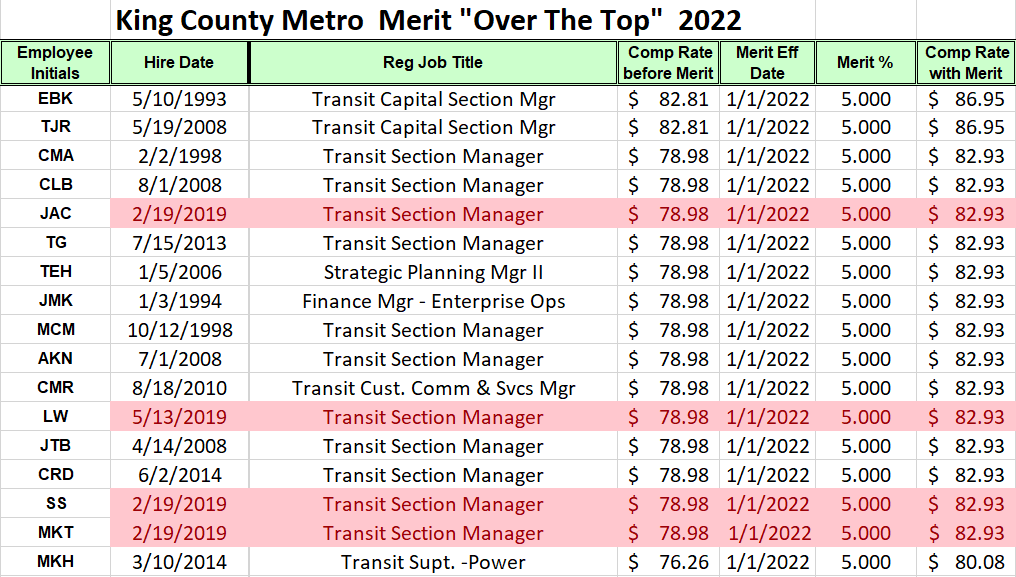
I’ve blocked out the full names of Metro’s Over the Top recipients for their privacy, but I will share the list with the full names with any local journalist who’s interested in pursing the story and contacts me through this page. Make note of the shaded rows because I’ll be discussing those below.
Problem: There’s no remotely objective standard of measurement
How do we know supervisors aren’t using Over the Top to reward favored employees? –We don’t. Tools could be developed to determine standard productivity and job performance for each job description, for example, and these could then be used to demonstrated that employee Joe Smith had “exceeded” them for a given year. But no such tools could be developed, so ultimately the decision is left in the supervisor’s hands.
There’s some vague guidance in the document below, but that document merely restates that the Over the Top bonus must be earned by outstanding performance and it must be earned year after year. It doesn’t say how such performance is to be measured, which means that it’s essentially left to the supervisor’s discretion.
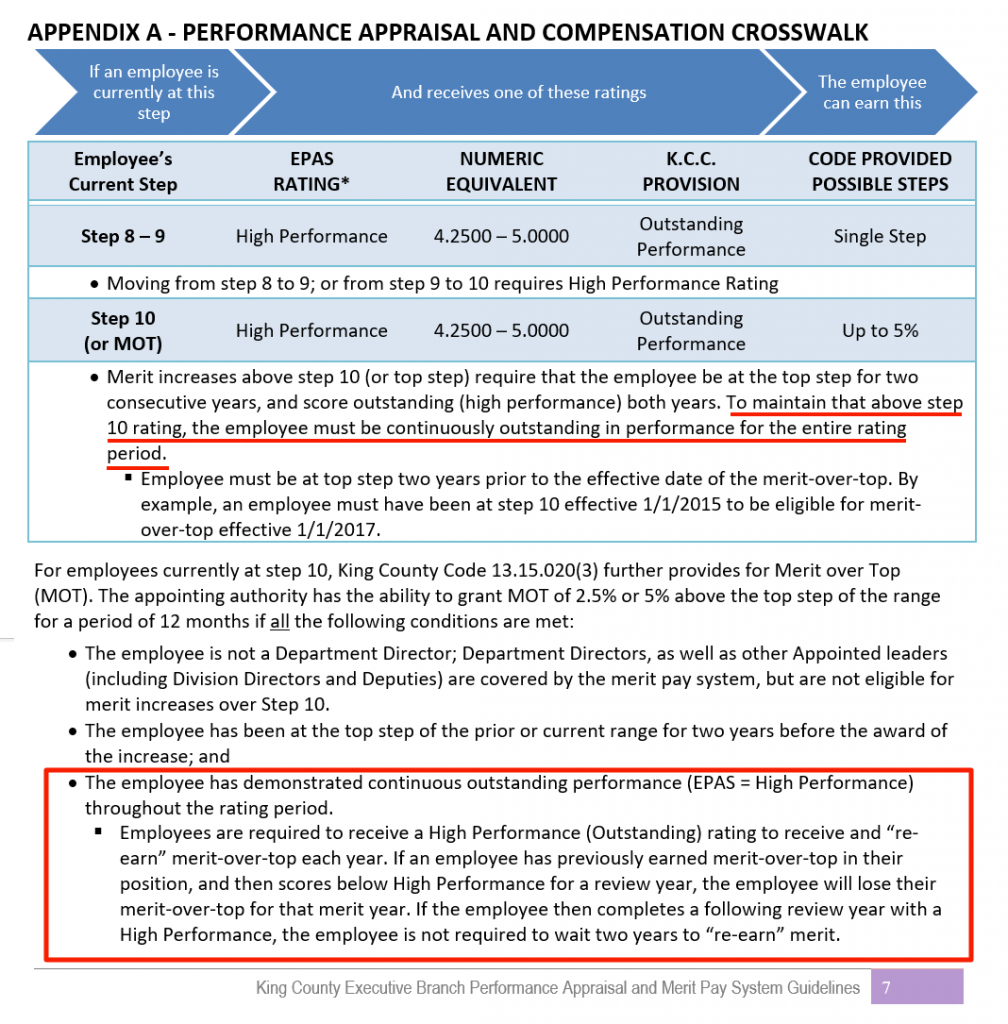
Problem: No one’s reviewing the bonus recommendations
It might keep the Over the Top system more honest if others could see exactly why Joe Smith got a bonus. Is there a way for the public – or the employee’s peers – to see why some people got the bonus and others didn’t? –No. An employee’s performance evaluation would have a record of the supervisor’s overall assessment of their performance, and there might be a bonus checkbox on there, or special wording (“I’m recommending Joe for a bonus”) or some special form to be filled out, but that information is privileged and can be viewed only by the supervisor, the individual employee, and the personnel department. It’s not subject to a public disclosure request by citizens or other employees. And that’s not necessarily a bad thing, because opening an employee’s performance file to the public could cause more mischief than it prevents. However, in the absence of public review, there should at least be a meaningful internal review process for checking the bonus awards.
So is there such a review? Theoretically yes, but in practice no. For Metro, the person who signs off on the bonuses for Metro employees and could review them if he wanted to is Metro general manager Terry White, but when White was asked by an employee whether he reviewed the recommendations, he said no.
Are ineligible employees getting Over the Top bonuses?
A sign that the bonuses are being awarded inappropriately is that a good number of them were apparently made in violation of the “two years at the top step” provision. Some of the rows highlighted in red in the bonus list linked above are for employees who were hired in at Metro less than two years before the bonus recommendation would have been made in an annual performance review, so normally they would not qualify for the bonus.
In the image below, I’ve highlighted the “less than two years” employees from the extract above. Note that these employees (JAC, LW, SS, and MKT) hired on at Metro in 2019, so the only way for them to have been eligible to get the bonus in 2022 is to have transferred in from another job in the King County system that was paying them at or above the top step for a transit section manager. There are 18 such employees in the complete bonus list for 2022. Were they all transfers from somewhere else in the County system? It doesn’t seem likely, but I will ask for information on the bonus recipient transfer status in a subsequent public disclosure request.
There could be many more bonus recipients who were ineligible, but we don’t whether there are because the data returned from the public disclosure request I used here doesn’t show what pay step the employees were on. I have since put in another public disclosure request.
Did work-at-home Metro Transit managers really do outstanding work?
Over the Top pay is awarded to Metro managers based on outstanding performance for the previous year, so the 2022 bonuses were given for work done in 2021. But due to the COVID pandemic, all these employees would have spent much of 2021 working from home, and many are still doing that.
Given that their supervisors weren’t able to view how well these employees were doing their jobs, how did they determine they’d done “outstanding” work? Not to say it’s impossible for an employee to do outstanding work from home, but given the temptation to slack off for an employee who doesn’t have a work quota and who knows no one is watching them, we would expect some adjustments to be made to the evaluation system used in the pre-pandemic days. Were such adjustments made? We don’t know, but it’s unlikely. What probably happened instead is that supervisors (who were themselves working from home) simply recycled their employee evaluations for the previous year or two along with their Over the Top recommendations. We could test this inferentially by comparing the list of the 2019 bonus recommendations (2019 being the last full pre-pandemic year) with the lists for the pandemic years of 2020 and 2021. If the lists were similar between pre-pandemic and pandemic years (adjusting for attrition and for newly eligible Metro employees) then we can infer that managers weren’t doing anything differently for the stay-at-homers and were just recycling their bonus recommendations year after year. Which is something an in-house auditor accused them of doing several years ago, as you’ll see.

Who’s the essential worker?
A better measure of whether a Metro manager is providing outstanding performance would not be their supervisor’s opinion of them but their customer’s opinion. So who was the customer? In some cases, it was the bus operators and maintenance staff. In the course of doing their jobs, the operators often have to talk to the various “base chiefs”* and those chiefs need to be onsite at the several Metro bases where buses park so they can talk with the operators for whom they were the first-line supervisors. But starting in early 2020 these base chiefs, too, just like other managers, were told to work from home.
What effect did base chiefs staying at home have on their bus driver customers? One driver told me that service from the chiefs declined noticeably after they were sent home. Turnaround time for phone calls increased dramatically, he said, and, as a result, issues weren’t getting fixed as fast. This in turn drove productivity down across the whole system.
This is not to blame the work-at-home base chiefs for those problems; many of them probably wanted to show up for work at the base, but they weren’t allowed to. Notwithstanding that, it’s hard to make the case that their performance was “outstanding” while bus driver calls weren’t being returned and productivity was sagging as a result.
It’s easy to see why bus operators would be disgruntled at their treatment relative to Metro managers. While managers they needed on the job were being sent home so they could be safe and not spread COVID, drivers, as “essential workers,” were still required to show up for work each day and expose themselves to thousands of potentially infected bus riders. In some cases, the most basic safety measures (required masks and spaced seating for passengers, Plexiglas screens protecting drivers) weren’t put in place until months after the drivers starting asking for them and months after the managers had already been sent home for their safety.
In addition to taking on the extra risks of being exposed to the public, drivers were routinely compelled to do overtime during the worst stage of the pandemic, averaging 12 hours a day in many cases. By contrast, managers were doing their same 40-hour pre-pandemic work week from the comfort and safety of their homes. (Metro was even giving them a furniture and wi-fi allowance.) There were no bonuses and no hazard pay for bus drivers and maintenance workers who had to report for duty as usual, but Over the Top bonuses were still being doled out to managers at their same pre-pandemic level, even as Metro was reeling from a budget shortage caused by revenue drying up during the pandemic. (See article below.)
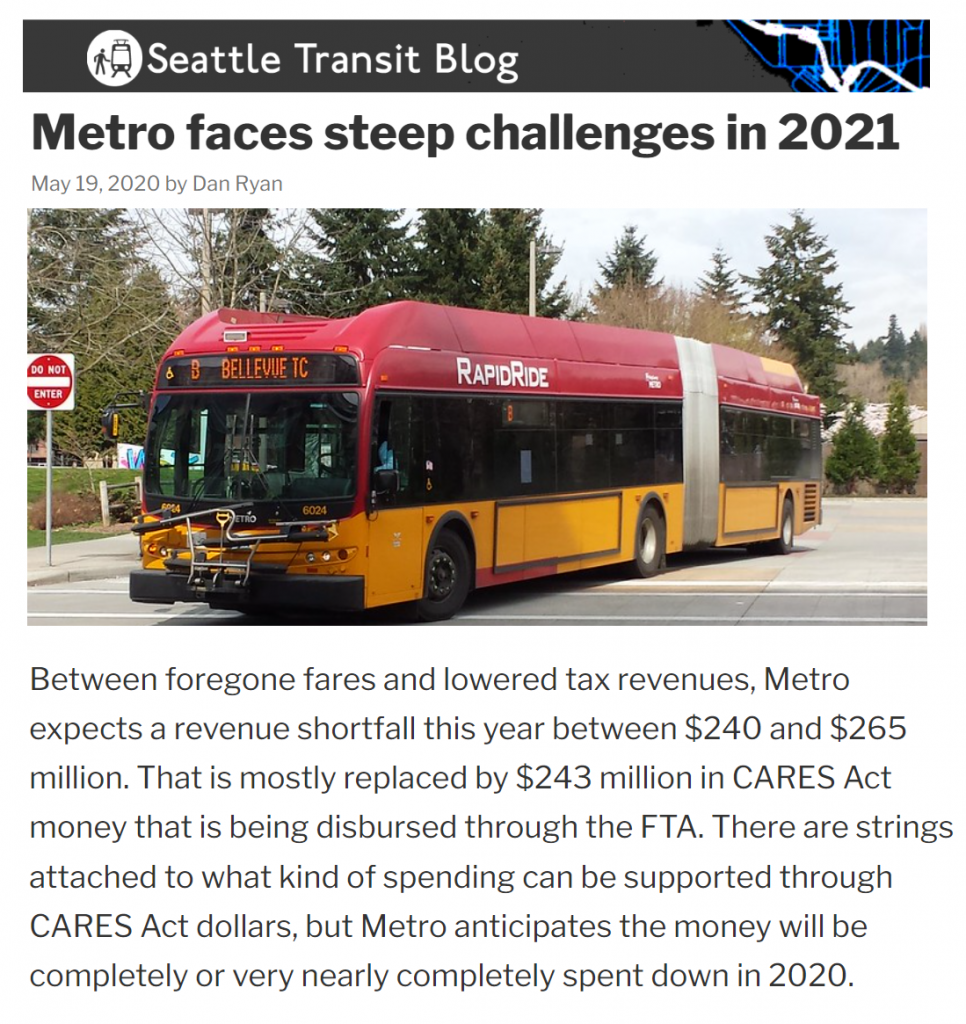
An auditor sees the problem but can’t find the solution
In 2017, the King County Auditor’s Office audited the Merit Over the Top (MOT) program in response to an employee complaint. For the three years they focused on (2013-2015) they found that a surprising 70% of management employees countywide had qualified for the bonus, and they projected that unless changes were made to tighten up the program, that percentage would stay about the same. As noted, the program is designed to serve as an incentive to exceptional employees to stick around, but, as the auditor’s summary report noted, if the bonus is being given to a majority of employees it defeats the purpose of rewarding superlative performance, and the bonus will eventually be seen by employees as something they’re entitled to rather than something they have to earn.
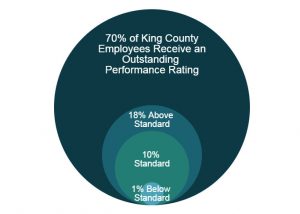 Supervisors might be feeling pressure to give employees the ratings they need to get the bonus year after year, the auditor’s report said, and “this is particularly true for employees already receiving MOT, who will have their pay reduced if their supervisor does not give them an outstanding performance rating. [The auditor] found that 97 percent of employees who received MOT in 2013 also received it in 2014.”
Supervisors might be feeling pressure to give employees the ratings they need to get the bonus year after year, the auditor’s report said, and “this is particularly true for employees already receiving MOT, who will have their pay reduced if their supervisor does not give them an outstanding performance rating. [The auditor] found that 97 percent of employees who received MOT in 2013 also received it in 2014.”
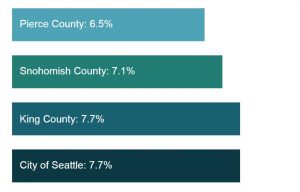 Perhaps most important, the audit discovered that one of the key premises of the program was faulty, namely, that high employee turnover was a problem for King County. Comparing the turnover rate among four local government employers, the auditor found that King County’s turnover rate was about the same as the others.
Perhaps most important, the audit discovered that one of the key premises of the program was faulty, namely, that high employee turnover was a problem for King County. Comparing the turnover rate among four local government employers, the auditor found that King County’s turnover rate was about the same as the others.
The auditor’s summary report is here:
merit-pay-2017-auditThe same problems the auditor identified in 2017 are still there today. The summary report ends on an unhopeful note, saying that “making [needed] changes will be challenging” and regretting the fact that there is no template for making those changes. “Unlike in many other areas where there are clear leading practices, [King County’s] compensation policy, particularly in the public sector, lacks widely agreed upon practices, making it difficult to determine the best way forward for MOT.”
The impetus for fixing the Over the Top program at Metro should come from the highest levels, starting with King County Executive Dow Constantine and Metro’s general manager Terry White. Unfortunately, Mr. White isn’t known for making substantive changes at his agency, and neither was his predecessor. Judging by the discrepancy between White’s speeches and blog posts and his actual record of accomplishments, White appears to have been hired for his “wokeness” and his support of his boss Dow Constantine’s ideological agenda rather than his competence.
“You’re doing a great job, Terry.”
Transit safety, ridership, and revenues began declining several years ago, and that process has continued into White’s tenure, which began in 2020. Bus operators and even the union president have complained to Constantine and White about vagrants smoking drugs on the buses and in shelters, but their concerns were ignored. White has applied himself more assiduously to projects like “Black Lives Matter” bus art, and he’s used Metro’s blog, funded by King County taxpayers, to make inflammatory (and often factually untrue) statements about policing and racial incidents in other states. All with the blessing of Executive Constantine.

“Black Lives Matter” bus in November of 2021. Source: King County Metro
It’s broke, but who’s going to fix it?
King County’s Over the Top bonus pay program for managers is highly subject to abuse. There’s no agency-wide standard for determining who should get the bonus and no effective review process. Apparently, all you need is a supervisor who likes you and is willing to say you’ve been doing outstanding work. The large proportion of managers receiving the bonus belies the claim that they’ve been doing “outstanding” work. After all: If everybody’s outstanding, then nobody is.
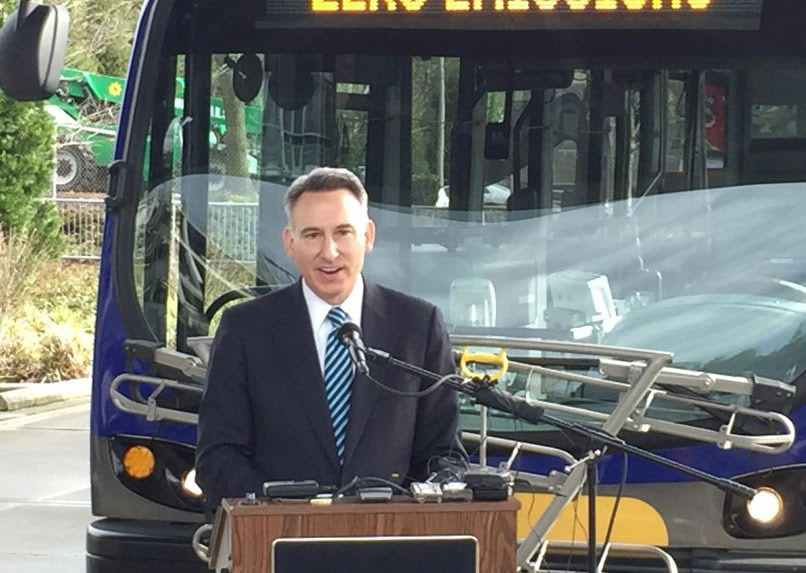
As if to underline the sloppiness of the program, it appears that the bonuses have been given to managers who couldn’t have been at the top step of their pay range for two years because they hadn’t even been working at Metro for that long. The problem of the ineligible employees getting the bonus has been brought to Metro’s attention by at least one employee and by the King County auditor, but in five years’ time, no action has been taken.
I raised this issue and others last month with Brian Cammozi of the King County Ombudsman’s office, but instead of answering my pointed questions about Over the Top, Cammozi referred me to the King County administrative code establishing the program and sent me a link to the 2017 auditor’s report. A Metro employee told me that he, too, got dead-ended by Cammozi, just as he’d been dead-ended by Terry White.
No one in charge at King County or Metro has refuted the Auditor’s findings or specific claims that Over the Top bonuses are being given to ineligible employees, but no one’s doing anything about it either. It’s precisely this kind of government waste and neglect for which a free press is the remedy, and that’s why the Blog Quixotic is pursuing this matter. In my next piece, I’ll discuss specific individuals who might have been given the bonus out of personal favoritism rather than merit.
–David Preston
Did you appreciate this article? Do you support honest journalism? Then please …


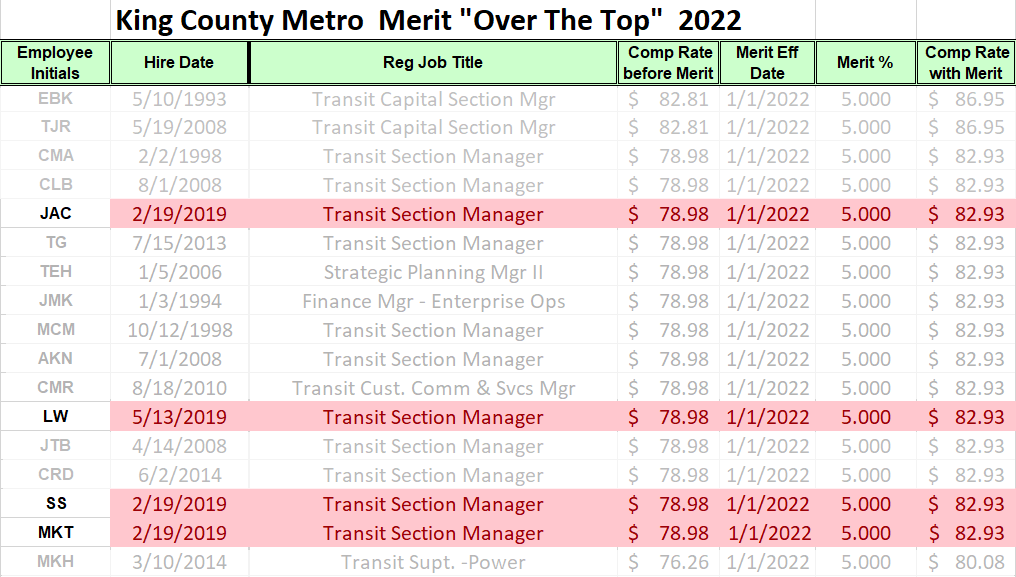

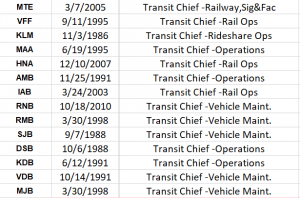 *See for example “Transit Chief – Operations” and “Transit Chief – Vehicle Maintenance” in the full list of bonus employees. There are a few dozen of these “base chiefs” in the list of Over the Top recipients.
*See for example “Transit Chief – Operations” and “Transit Chief – Vehicle Maintenance” in the full list of bonus employees. There are a few dozen of these “base chiefs” in the list of Over the Top recipients.





